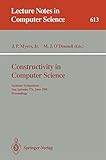Constructivity in Computer Science [electronic resource] : Summer Symposium San Antonio, TX, June 19–22, 1991 Proceeding / edited by J. Paul Myers, Michael J. O'Donnell.
Material type: TextSeries: Lecture Notes in Computer Science ; 613Publisher: Berlin, Heidelberg : Springer Berlin Heidelberg, 1992Description: XI, 253 p. online resourceContent type:
TextSeries: Lecture Notes in Computer Science ; 613Publisher: Berlin, Heidelberg : Springer Berlin Heidelberg, 1992Description: XI, 253 p. online resourceContent type: - text
- computer
- online resource
- 9783540472650
- 005.131 23
- QA8.9-QA10.3
 E-BOOKS
E-BOOKS
| Home library | Call number | Materials specified | URL | Status | Date due | Barcode | |
|---|---|---|---|---|---|---|---|
| IMSc Library | Link to resource | Available | EBK6025 |
Connecting formal semantics to constructive intuitions -- Kripke semantics for dependent type theory and realizability interpretations -- Reflective semantics of constructive type theory -- Are subsets necessary in Martin-Löf type theory? -- Development transformation based on higher order type theory -- Classical proofs as programs: How, what and why -- Classical type theory -- Axiomatization of calculus of constructions -- A logical view of assignments -- Constructivity issues in graph algorithms -- Constructive topology and combinatorics -- Implementing constructive real analysis (preliminary report) -- Examples of semicomputable sets of real and complex numbers -- Bringing mathematics education into the algorithmic age -- The type structure of CAT -- A simple and powerful approach for studying constructivity, computability, and complexity.
Mathematicians have long recognized the distinction between an argument showing that an interesting object exists and a procedure for actually constructing the object. Computer science adds a new dimension of interest in constructivity, since a computer program is a formal description of a constructive procedure that can be executed automatically. It has beenover a decade since a conference was devoted to constructivity, and never before has one been held specifically relating computer science to constructivity. Thus, this proceedings volume is the most concentrated offering ever produced of the diverse ways in which constructivity and computer science are related. The papers cover semantics and type theory, logic and theorem proving, real and complex analysis, topology and combinatorics, nonconstructive graph-theoretical techniques, and curriculum and pedagogic issues. The book offers a concentrated view of the many ways in which constructivity has assumed importance in computer science, and contains results available nowhere else.
There are no comments on this title.

